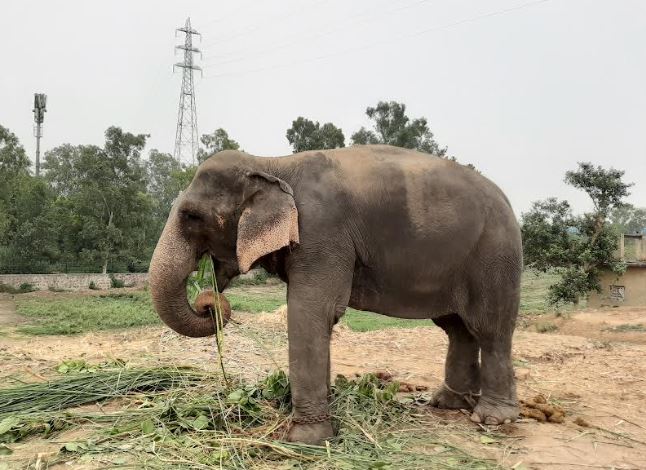In response to media reports that speak about a temple in South Delhi that is planning to bring an elephant from Assam soon, World Animal Protection has written to the Prime Minister of India, Chief Minister of Delhi and Lieutenant Governor of Delhi to stop the transfer on grounds of animal cruelty and wildlife conservation. “As an organization with more than three decades of experience in working with elephants, we submit to you that elephants suffer in captivity and fundamentally belong in their natural habitat, in the wild. Going by your own pronouncements on media multiple times, all living creatures, including elephants, should be respected for what they are, as they enhance our lives, with all their cultural, historical and ecological significance,” says Gajender Kumar Sharma, Country Director of World Animal Protection in India.
Lakshmy, the last privately held elephant in Delhi in 2019 beside Yamuna Bank Photograph credit: Shubhobroto Ghosh
The elephant is the National Heritage Animal of India. The elephant faces multiple threats to existence by way of habitat destruction, poaching for ivory and the live animal trade. Captive elephants face a difficult life, such as the riding elephants incarcerated in Rajasthan for giving rides to tourists in Amer Fort in Jaipur.
Sainik Farms in Delhi is no place for a captive elephant and six years after the Delhi High Court order to phase out captive elephants in the capital, we are again faced with the prospect of torture and suffering of a sentient being in the midst of a city. In case it is necessary to worship an elephant in Delhi, a model or a robot elephant can be used. The money and resources needed to maintain a live elephant in captivity, can be donated to save wild elephants, just like World Animal Protection has done recently, to save elephants in the aftermath of the floods in Kaziranga National Park, a UNESCO World Heritage Site in Assam.
“By keeping animals like elephants where they belong, we will maintain their cultural and religious status as Ganesha that is revered in India, and reinforce the central theme for preserving all wild creatures, that wild animals belong in the wild,” according to Gajender Kumar Sharma, Country Director, World Animal Protection in India.
World Animal Protection beseeches authorities to take note of this plea, and ensure that no elephant is brought from Assam and kept captive in Delhi. World Animal Protection has full faith in the judgement of the Prime Minister as the leader of the country who promotes compassion for all living creatures under the phrase, ‘Vasudhaiva kutumbakam’, “the world is one family”, and all living things are our brothers and sisters, as stated by Sir Kenneth Clark in his landmark television series, Civilisation, in 1969. We must honour the tradition of Buddha, Mahavira and Mahatma Gandhi and practice non violence to all living things, including elephants, and not torture them in captivity for selfish purposes.
In response to media reports that speak about a temple in South Delhi that is planning to bring an elephant from Assam soon, World Animal Protection has written to the Prime Minister of India, Chief Minister of Delhi and Lieutenant Governor of Delhi to stop the transfer on grounds of animal cruelty and wildlife conservation. “As an organization with more than three decades of experience in working with elephants, we submit to you that elephants suffer in captivity and fundamentally belong in their natural habitat, in the wild. Going by your own pronouncements on media multiple times, all living creatures, including elephants, should be respected for what they are, as they enhance our lives, with all their cultural, historical and ecological significance,” says Gajender Kumar Sharma, Country Director of World Animal Protection in India.
Lakshmy, the last privately held elephant in Delhi in 2019 beside Yamuna Bank Photograph credit: Shubhobroto Ghosh
The elephant is the National Heritage Animal of India. The elephant faces multiple threats to existence by way of habitat destruction, poaching for ivory and the live animal trade. Captive elephants face a difficult life, such as the riding elephants incarcerated in Rajasthan for giving rides to tourists in Amer Fort in Jaipur.
Sainik Farms in Delhi is no place for a captive elephant and six years after the Delhi High Court order to phase out captive elephants in the capital, we are again faced with the prospect of torture and suffering of a sentient being in the midst of a city. In case it is necessary to worship an elephant in Delhi, a model or a robot elephant can be used. The money and resources needed to maintain a live elephant in captivity, can be donated to save wild elephants, just like World Animal Protection has done recently, to save elephants in the aftermath of the floods in Kaziranga National Park, a UNESCO World Heritage Site in Assam.
“By keeping animals like elephants where they belong, we will maintain their cultural and religious status as Ganesha that is revered in India, and reinforce the central theme for preserving all wild creatures, that wild animals belong in the wild,” according to Gajender Kumar Sharma, Country Director, World Animal Protection in India.
World Animal Protection beseeches authorities to take note of this plea, and ensure that no elephant is brought from Assam and kept captive in Delhi. World Animal Protection has full faith in the judgement of the Prime Minister as the leader of the country who promotes compassion for all living creatures under the phrase, ‘Vasudhaiva kutumbakam’, “the world is one family”, and all living things are our brothers and sisters, as stated by Sir Kenneth Clark in his landmark television series, Civilisation, in 1969. We must honour the tradition of Buddha, Mahavira and Mahatma Gandhi and practice non violence to all living things, including elephants, and not torture them in captivity for selfish purposes.


